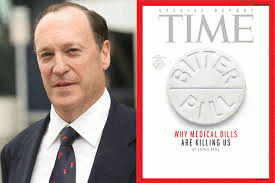
|
She can be reached at trudy.lieberman@gmail.com and can be followed on Twitter at trudy_lieberman. SHARE |
|
She has won 26 national and regional reporting awards and other honors, including two National Magazine Awards, 10 National Press Club Awards, five Society of Professional Journalists Deadline Club Awards, a John J. McCloy Fellowship to study health care in Germany, a Joan Shorenstein Fellowship from Harvard University to study media coverage of medical technology, an honorary doctorate of humane letters from the University of Nebraska, and two Fulbright Fellowships---a senior scholar award to study health care in Japan and a senior specialist award to participate in training conferences in the United Kingdom for European health journalists. She is the author of five books including Slanting the Story the Forces That Shape the News and the Consumer Reports Guide to Health Services for Seniors, which was named by Library Journal as one of the best consumer health books for 2000.
Lieberman is an adjunct associate professor of public health at City University of New York where she teaches courses on the media's influence on public health. She was director of the health and medical reporting program at the Graduate School of Journalism, City University of New York, has taught media ethics in the Science, Health and Environmental Reporting Program at New York University, and has been an adjunct professor of journalism at Columbia University. In 2006, she was a Beamer-Schneider SAGES Fellow at Case Western Reserve University where she taught courses on media ethics and the ethics of health care delivery. In 2007, she was appointed the James H. Ottaway visiting journalism professor at SUNY New Paltz where she taught a course on the media and the marketplace. In 2011, Lieberman was named the Soderlund Visiting Professor in the College of Journalism and Mass Communication at the University of Nebraska where she taught public affairs reporting.
Lieberman served five years as the president of the Association of Health Care Journalists, a professional organization of over 1300 journalists who cover health and medicine, and continues to serve on the board of directors as immediate past president. She is currently a national advisory council member of the California Health Benefits Review Program. She has served on the board of directors for the National Committee for Quality Assurance, the Medicare Rights Center, and Village Care of New York. Lieberman appears on many panels and lectures widely on health care in the U.S. She holds a B.S. with distinction from the University of Nebraska and earned a certificate in business and economics journalism from Columbia University's Graduate School of Journalism where she was a Knight-Bagehot Fellow in 1976-77.
She can be reached at trudy.lieberman@gmail.com and can be followed on Twitter at trudy_lieberman.
OpEd News Member for 636 week(s) and 2 day(s)
44 Articles, 0 Quick Links, 0 Comments, 0 Diaries, 0 Polls
List By Date
Page 1 of 3 First Last Back Next 2 3 View All
Steven Brill's "Time' Magazine Manifesto On Healthcare Costs Smashes Fences Trudy Lieberman examines Steven Brill's Time magazine article "Bitter Pill" which she writes "has a chance to reframe the way we think and talk--and report--about healthcare costs." "In a penetrating, systematic, and long look at medical care" Brill zooms in on the nation's unrealistic and destructive healthcare costs--why they exist and persist"

Comparing U.S., Canadian health care systems One thing Americans and Canadians can agree on is that we don’t want each other’s health care systems. In truth, most Americans don’t know how Canada’s system works and Canadians don’t know much about the U.S. system.

Steven Brill's Blockbuster Article "Bitter Pill: Why Medical Bills Are Killing Us" -- the aftereffects Steven Brill, shook up the healthcare establishment last March with his 36-page expose in Time, "Bitter Pill: Why Medical Bills are Killing Us." The piece, which closely examined the reasons that US healthcare costs so much, has reverberated far and wide. Recently I interviewed Brill to talk about the reaction to his story, the state of healthcare journalism, and where the discussions about our healthcare system should go.

Report Card on Social Security Trust Fund Coverage - An F for the headlines; a C- for the stories Last week, Social Security trustees issued their annual report on the program's financial health. The news was expected: Social Security will be able to pay full benefits to Americans currently receiving benefits and those new to the system for the next 21 years. With a few exceptions the media delivered mostly doomsday headlines, and most reporters chose to convey alarmist messages that were not even implied in the report.
How the Media Has Shaped the Social Security Debate -- The Press Plays a Dubious Role Social Security is an issue that, according to six decades of Gallup polls enjoys some 70 percent of the public support. Many opinion makers, politicians and policy gurus, contend that this most basic of retirement programs is in grave danger, and the media has too often reported misleading or flat-out wrong "facts," giving the public only one side of the story.

What reporters forgot to tell you about the 'doc fix' bill and changes to Medicare There are key questions reporters ought to tackle whenever the House or Senate passes a bill. Coverage of the "doc fix" bill passed by the House last week, unfortunately, did not adequately address critical points. This is a bill that--in addition to reauthorizing the Childrens' Health Plan (CHIP) for two years and permanently fixing the way doctors are reimbursed for Medicare patients, both of

Obamacare Exchange Watch: Low Healthcare Costs or California Dreaming? Low projected premiums for Obamacare healthcare Exchanges were the big news in California last week. But the story the media told was a flawed one, characterized by gee-whiz reporting, a willingness to accept official spin, and failure to ask basic questions.

Untangling Obamacare: What's behind the rate increases? The Affordable Care Act primarily affects the roughly 15 million people who buy their insurance on their own. In that group, some premiums will increase, while others will decrease. Some will get subsidies while others will not. But insurance pricing is tricky. What follows is a brief primer on some of the nuts and bolts of rates and premiums, which, not so incidently are key to the success or failure of Obamacare.

Medicare Uncovered: Negotiating Drug Prices Would Save Billions. Why Isn't It on the Table? Certain politicians are pushing for raising the eligibility age, making more people pay higher premiums, and changing Medigap policies so they would not cover as much. The idea is to require beneficiaries to have more "skin in the game," as the wonks often put it. In other words, it would make them pay more for their care. The goal: Prompt them to use fewer medical services by making them pay more out-of-pocket.

Healthcare Exchange Watch: Ohio's Phony Tale About Rising Premiums Officials in Ohio are warning Buckeye State consumers that "insurers expect the cost to cover healthcare expenses for consumers will significantly increase." Never mind that their predictions are based on what insurers have told them their "costs" will be--not on the actual premiums they plan to charge.

U.S., Canadian health care systems share some challenges Both countries are historically and practically relatively expensive. In 2011, the U.S. won the dubious honor of having the most expensive system in the world, spending about $8,500 per capita. Canada spent about $4,500, making it the third most expensive country among a group of OECD-developed nations. When I explained the high out-of-pocket expenses to Canadians, that notion simply did not compute.

Cost Curve: Hospitals Are Raising the National Healthcare Bill Hospitals account for about one-third of US health expenditures, but their bottom lines are being squeezed, and they are raising prices for services to make up for the shortfall. Doctors and hospitals hold the keys healthcare cost-control, but recent news reports suggest they may not be using them any time soon.

The Medicare "Doctor Fix" - Will Seniors Have to Pick Up The Tab? If Medicare beneficiaries take a hit that resulst in benefit reductions, the backlash will be a noisy one. But beyond the political fall-out from reducing benefits and making seniors pay more out of pocket, those depending on the program for medical care need to know what’s going on. If the press doesn’t tell them, who will?

Investigating a $150 billion Medicare 'black box' An investigation of Medicare Advantage plans has exposed government hypocrisy and stonewalling, regulatory neglect, insurance company greed, and corporate exploitation of a program hailed as the fiscal savior for Medicare. It underscores the acute need for more accountability and oversight not only from the Obama administration but also from the press, which has all but abandoned reporting much of anything about Medicare.

Six times Medicare caved Reporters don't often cover the rule-making process that goes on at government agencies. If they do, they typically borrow from a press release announcing the agency has proposed this or that new regulation, and then the story dies a quiet death. Rarely is there any follow-up when regulated industries howl, or when successful lobbying results in the agency cancelling its proposed regulations.

PBS: Missing Context and Incomplete Reporting Mislead the Public About Disability and Social Security Missing context abounded in the recent program "Unfit for Work--the startling rise of disability in America," produced by This American Life and Planet Money, which aired on public radio at the end of March. It left the false impression that freeloaders are gaming Social Security's disability program. The piece did a disservice to an important safety net crucial to the survival of some of the sickest people around.
Jon Stewart Takes on Sebelius - What Madame Secretary didn't say Trudy Lieberman covers the healthcare reform beat for The Columbia Journalism Review and often takes the mainstream media to task for its failure to adequately inform the public on this very important issue. In this column she gives credit where credit is due: To Jon Stewart for asking HHS Secretary Kathleen Sebelius some tough questions about The Affordable Care Act (sometimes referred to as "Obamcare")
The Myth of the Social Security "Greedy Geezer": A Compliant Press Too Easily Accepts the Young Vs. Old Frame A meme persists in the media that suggests that the elderly have it too good. They claim too much of the country's financial resources and will eat their children's --and grandchildren's -- breakfast, lunch, and dinner unless Social Security and Medicare are cut. The press, for the most part, has been presenting a one-sided picture of the Social Security situation, quite possibly to the detriment of young and the old.
The New Medical-Credit Record - Patients Are Getting Medically and Financially Shafted Unbscrupulous members of the medical profession are out to make a buck with an assist from well-known lenders that include JP Morgan Chase, GE Capital and Capital One. This "health and beauty needs" credit card is hawked to vulnerable patients by doctors, and it can lead to more costly overtreatment at interest rates that of 24 percent or higher.
The Case of the Missing Health Insurance Premium the Affordable Care Act requires health insurance companies to be more transparent when offering health insurance policies. Unfortunately, Health and Human Services has decided not to require them to include the cost of premiums, without which comparison shopping for benefits versus cost requires considerable due diligence and research savvy on the part of the consumer. The media seems not to have noticed this shortcoming.

An Obamacare scorecard Part 1: What's gone, what's on hold, and what's still in place For all the controversy about the Affordable Care Act, confusion and lack of knowledge among the public is still widespread. Meanwhile, it keeps changing, as portions are altered, fixed, or dropped. After all those changes, what is Obamacare, exactly? What is out, what is on hold, and what is still standing in this large and controversial law? What are Obamacare's plusses and minuses so far? Part 1 of a two-part scorecard.

Push Back Against Expensive Medicines Many Americans have begun to realize they're paying too much for prescription drugs. The introduction last year of Sovaldi, along with its hefty price tag -- $84,000 for a three-month regimen -- has sparked a conversation. Insurers have begun factoring the price they are paying for the drug into the premiums all of us will pay for health insurance.
A Grand Bargain on Simpson-Bowles? The Press Is Sending Signals But Not Explanations Politicians, including Senators Nancy Pelosi and Mark Udall, and Beltway Elites like JP Morgan/Chase's Jamie Dimon appear to be preparing us for a grand bargain that would produce dramatic changes to Medicare and Social Security. The media is picking up the signals and reporting them, but is failing to clue in the public about what is in store for them if Simpson-Bowles were to pass.

The missing villain in the healthcare drama As the meme goes, the chief villains responsible for the high cost of American healthcare are waste, overtreatment, fee-for-service medicine, unaccountable hospitals, and paying for treatments that don't work. Obamacare fixes reflect that meme. But are the accepted villains really the central villains, or just the easiest ones to target?

Big Pharma's Surrogate Campaign to Kill Medicare Drug Discounts The president's budget proposal provides for discounted drugs for some poor people on Medicare via rebates from pharmaceutical makers who, in turn, are trying to kill it through lobbying by disease advocacy groups and other industry allies. Similar efforts by health insurers just succeeded in reversing planned cuts to Medicare Advantage plans by the Centers for Medicare and Medicaid Services into rate increases.

Medicare Uncovered: Cost cutting? We can't have that! A classic healthcare-lobbying shootout between the government and the medical device industry over cost containment in Medicare -- the $508 billion program pols tell us costs too much -- is in the making. Most of the media, except for a few alert trade publications have been snoozing on this one. And it's a fascinating tale that gets to the heart of the problem in American healthcare--what to do about its high price.

How to measure Obamacare success What would Obamacare success look like, and what metrics should we use to measure it? And since it will likely still be years before we can render an informed judgment on the program’s efficacy at meeting its goals, and there are lots of incremental stories to write in the meantime, how do we cover those stories without passing on the agendas of one side or another in the Obamacare message war?

Obamacare's Forgotten Faces - The Medicaid debacle and other tales Largely ignored by the press in the healthcare reform debate is the equity question -- the fair distribution of healthcare to those who need it, a leveling of barriers (cost barriers or other kinds) to care, largely because the framers of the law never talked about it. As the press begins to unravel the ironies laced through the health reform law, it's good to think about giving voice to those who will be left out.

What's health insurance really going to cost? It's that time of year again, when insurance companies propose the rates they'd like to charge for the policies they'll sell on the exchanges from November through February. These numbers are preliminary, subject to state and sometimes federal review and approval, but you wouldn't necessarily know that by the certainty and simplicity with which stakeholders spin them and reporters cover them.
The failure to explain health reform - Whose Fault is it that the Public Doesn't Understand? The Affordable Care Act is a mystery to much of the public. It is poorly understood amid Republican demagoguery, a weak Democratic sales effort, and waning media coverage. Sky-rocketing insurance deductibles and co-pays are a growing public concern. Attacks on the Act's funding mechanisms threaten to reduce benefits and subsidies. Those are important questions overlooked by a press waiting for cues from the president.

Exchange Watch: Are New Yorkers getting a bargain? A closer look is in order Hallelujah! New York's insurance exchange, long kept under wraps by Gov. Andrew Cuomo, has finally brought forth some information about the rates that health insurers will charge New Yorkers next year via an apparent leak to the New York Times which ran the news with a dramatic headline: "Health Plan Cost for New Yorkers Set to Fall 50%." But a closer look is in order.
Fox News Smoke Signals: Dems and the GOP hint they are close on Medicare Cuts Advocates for seniors recently told a subcommittee of the House Ways and Means Committee that Medicare seniors pay about 15 percent of their income on healthcare, compared to about five percent for younger groups. Democratic Senator Dick Durbin and Republican Senator Bob Corkers still seem to feel that seniors do not have enough skin in the game." Both are hinting that making seniors pay more is on the table.

Exchange Watch: What's going on with New York? The Silence Is Deafening New York State got kudos from Obamacare supporters because Gov. Andrew Cuomo did an end run around Republicans in the state legislature and established the exchange by executive order. But what to we know about the New York Exchanges? We don't know much, and it's time the media pressed Albany much harder to tell us something useful. The workings of Obamacare were supposed to be open, we were told.

Exchange Watch: Vermont Vermont's Green Mountain Care Board recently announced rates that will be charged by insurers selling through Vermont Exchanges in the Fall. The rates will reportedly be "comparable" to what they would be if the exchange did not exist. Not reported by the media was that this is the scenario likely to be replicated in other states when the new rules take effect in January.

Chained CPI: NPR "He-Said/She-Said Reporting Just Doesn't Cut It A piece on NPR's All Things Considered that aired last week did little to enlighten listeners about a major change known as "Chained CPI," proposed by the President for calculating future Social Security cost of living increases. NPR's he-said/she-said coverage likely left NPR-land listeners as confused as ever. Surely NPR can do better helping them understand what the fuss is all about.

The Obamacare ad wars begin An opening salvo from conservatives scores low on honesty. This week, Americans for Prosperity, a group that espouses small government and is funded by the Koch Brothers, aimed directly at something near and dear to many Americans: the ability to choose their own doctors. The commercial fails. It is clever. It does contain a kernel of truth but overall it's misleading and deceptive.

The press finds another Obamacare delay The New York Times reported last week that the Obama administration is delaying yet another provision of the Affordable Care Act--this time, an important one that will affect household pocketbooks in short order. The article disclosed that a much-touted provision will be delayed for a year, postponing out-of-pocket spending limits on consumers with insurance to no more than $6,350, or no more than $12,700 for families.

Exchange Watch: The Media Passes Along White House Spin When the administration released rates last Tuesday showing premiums in states where the federal government will run the exchanges, the announcement, Politico reported, came with "one big catch: the report doesn't actually reveal very much about what most people will pay."

An Obamacare scorecard: Part 2 - The hits, misses, and mixed reviews In Part 1 we examined what parts of the original law have been implemented, what parts are on hold, and what parts are gone. In this, Part 2, we assess the law as it stands so far--its hits and its misses, as well as the parts that get mixed reviews.

Carol's story: One woman tries to navigate the Obamacare insurance jungle The full implementation of Obamacare calls for old-fashioned consumer reporting. Many features of the Affordable Care Act are already in place, but now comes its central pillar: the requirement for most Americans to carry health insurance, starting January 1, or face tax penalties. Readers will be forever grateful if journalists help them find their way through the confusion of the liftoff.

Medicare "Truth Checking" Falls Short What is it about Medicare's oversight of the nation's doctors that allows these outliers to continue business as usual despite a sanction now and then? The US healthcare system has evolved from a cottage industry to a profit-driven marketplace--what is it, politically, that has made this transition possible and allowed these doctors to continue flourishing?
USA Today Touts the Government's Good News on Medicare-- But was it the full story? We might be able to excuse the administration's inclination to put the best spin on the non-controversial aspects of the health reform law as part of its campaign talking points. But we can't excuse journalists for not looking beyond the stuff they are being fed.

Medicare Uncovered: Figuring out the president's plan You have to give the AP an A for effort, for at least trying to tell its huge audience about one aspect of the president's major Medicare proposal. But when it comes to judging the quality of the AP's story, a grade of C minus might be more appropriate. for some Medicare services but that's about it. Not much context. The piece loses people in a fog of numbers that obscure rather than clarify.

Implementing Obamacare: The Fine Print (Carol's Story Sidebar) Who's eligible?; Is your employer coverage is inadequate?; What if what you have to pay for employer coverage is out of your price range?; what are the penalties if I fail to purchase insurance?; Will some people find it cheaper to take the penalty then buy insurance? The jargon: Deductible, Copayment, Coinsurance Tradeoffs: Risk versus coverage; Premiums versus coinsurance, copays, and deductibles The essential benefits

